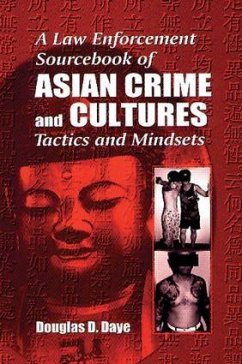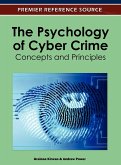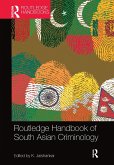Douglas D. Daye
A Law Enforcement Sourcebook of Asian Crime and CulturesTactics and Mindsets
Douglas D. Daye
A Law Enforcement Sourcebook of Asian Crime and CulturesTactics and Mindsets
- Gebundenes Buch
- Merkliste
- Auf die Merkliste
- Bewerten Bewerten
- Teilen
- Produkt teilen
- Produkterinnerung
- Produkterinnerung
Even in multicultural North America, few whites, blacks, or Hispanics have extensive experience or understanding of Asian culture
Andere Kunden interessierten sich auch für
![Training Law Enforcement Officers Training Law Enforcement Officers]() Rick D. GiovengoTraining Law Enforcement Officers57,99 €
Rick D. GiovengoTraining Law Enforcement Officers57,99 €![Crime and Punishment in the Future Internet Crime and Punishment in the Future Internet]() Sanja MilivojevicCrime and Punishment in the Future Internet198,99 €
Sanja MilivojevicCrime and Punishment in the Future Internet198,99 €![Crime Prevention Technologies and Applications for Advancing Criminal Investigation Crime Prevention Technologies and Applications for Advancing Criminal Investigation]() Crime Prevention Technologies and Applications for Advancing Criminal Investigation204,99 €
Crime Prevention Technologies and Applications for Advancing Criminal Investigation204,99 €![The Psychology of Cyber Crime The Psychology of Cyber Crime]() Gráinne KirwanThe Psychology of Cyber Crime205,99 €
Gráinne KirwanThe Psychology of Cyber Crime205,99 €![Routledge Handbook of South Asian Criminology Routledge Handbook of South Asian Criminology]() Routledge Handbook of South Asian Criminology66,99 €
Routledge Handbook of South Asian Criminology66,99 €![Handbook of Research on Cyber Crime and Information Privacy, VOL 2 Handbook of Research on Cyber Crime and Information Privacy, VOL 2]() Handbook of Research on Cyber Crime and Information Privacy, VOL 2295,99 €
Handbook of Research on Cyber Crime and Information Privacy, VOL 2295,99 €![Handbook of Research on Cyber Crime and Information Privacy, VOL 1 Handbook of Research on Cyber Crime and Information Privacy, VOL 1]() Handbook of Research on Cyber Crime and Information Privacy, VOL 1293,99 €
Handbook of Research on Cyber Crime and Information Privacy, VOL 1293,99 €-
-
-
Even in multicultural North America, few whites, blacks, or Hispanics have extensive experience or understanding of Asian culture
Hinweis: Dieser Artikel kann nur an eine deutsche Lieferadresse ausgeliefert werden.
Hinweis: Dieser Artikel kann nur an eine deutsche Lieferadresse ausgeliefert werden.
Produktdetails
- Produktdetails
- Verlag: CRC Press / Routledge
- Seitenzahl: 462
- Erscheinungstermin: 13. November 1996
- Englisch
- Abmessung: 240mm x 161mm x 29mm
- Gewicht: 854g
- ISBN-13: 9780849381164
- ISBN-10: 0849381169
- Artikelnr.: 21277946
- Herstellerkennzeichnung
- Libri GmbH
- Europaallee 1
- 36244 Bad Hersfeld
- gpsr@libri.de
- Verlag: CRC Press / Routledge
- Seitenzahl: 462
- Erscheinungstermin: 13. November 1996
- Englisch
- Abmessung: 240mm x 161mm x 29mm
- Gewicht: 854g
- ISBN-13: 9780849381164
- ISBN-10: 0849381169
- Artikelnr.: 21277946
- Herstellerkennzeichnung
- Libri GmbH
- Europaallee 1
- 36244 Bad Hersfeld
- gpsr@libri.de
Douglas D. Daye
Introduction: "If You Don't Have Much Time." Basics - What? Why? How? -
Benefits, and Sources. Culture, Police, and Asian Crime. Cultural "Do's and
Don'ts": Public Relationships. Person-to-Person Relationships. Interviewing
Witnesses, Victims, and Monks. Witnesses and Some Cross-Cultural Aspects of
Trials. Suspect's Records and Affiliations. Interrogating Suspects and
Recruiting Informants. Numbers, Gambling, Tattoos, Food,. and Regionalism.
Ethnic Mindsets, Profiles, and Religions: Contrasting Chinese and American
Mindsets. Major Components of Chinese Mindsets. Ethnic Profile: The
Chinese. Five Deep Cultural Mindsets. Is Reading Chinese Ethnic Strategists
Relevant for Police? Chinese Language, Names, and Holidays. Ethnic Profile:
The Vietnamese. Asian Buddhism and Chinese Confucianism. Recording,
Preserving, Training, and Planning: Standard Telegraphic Code (STC).
Preserving the Cross-Cultural Skills Police Already Possess. The Unnoticed
Pressures on Asian-American Officers. Supplementing the Planning of
Criminal Justice and In-Service Training Programs. A Criminal Justice
Prejudice? Cross-Cultural Studies Belong to Social Science. Community
Policing and Cross-Cultural Training Programs. Afterword. Appendix A:
Chinese Triads, Triad Organizations, and Triad Relationships. Appendix B:
Common Chinese Surnames and Notes on Chinese Language and Dialects.
Appendix C: Guanxi: An Important Concept for the Law Enforcement Office.
Appendix D: Overcoming Language and Cultural Barriers in Dealing with Asian
Organized Crime. Appendix E: Chinese Culture and the Practice of Actuarial
Intelligence. Glossary. Endnotes. Index. Art: Use the Chinese symbol
"Guanxi," which I have placed in the file and have attached to the flyer
copy.
Benefits, and Sources. Culture, Police, and Asian Crime. Cultural "Do's and
Don'ts": Public Relationships. Person-to-Person Relationships. Interviewing
Witnesses, Victims, and Monks. Witnesses and Some Cross-Cultural Aspects of
Trials. Suspect's Records and Affiliations. Interrogating Suspects and
Recruiting Informants. Numbers, Gambling, Tattoos, Food,. and Regionalism.
Ethnic Mindsets, Profiles, and Religions: Contrasting Chinese and American
Mindsets. Major Components of Chinese Mindsets. Ethnic Profile: The
Chinese. Five Deep Cultural Mindsets. Is Reading Chinese Ethnic Strategists
Relevant for Police? Chinese Language, Names, and Holidays. Ethnic Profile:
The Vietnamese. Asian Buddhism and Chinese Confucianism. Recording,
Preserving, Training, and Planning: Standard Telegraphic Code (STC).
Preserving the Cross-Cultural Skills Police Already Possess. The Unnoticed
Pressures on Asian-American Officers. Supplementing the Planning of
Criminal Justice and In-Service Training Programs. A Criminal Justice
Prejudice? Cross-Cultural Studies Belong to Social Science. Community
Policing and Cross-Cultural Training Programs. Afterword. Appendix A:
Chinese Triads, Triad Organizations, and Triad Relationships. Appendix B:
Common Chinese Surnames and Notes on Chinese Language and Dialects.
Appendix C: Guanxi: An Important Concept for the Law Enforcement Office.
Appendix D: Overcoming Language and Cultural Barriers in Dealing with Asian
Organized Crime. Appendix E: Chinese Culture and the Practice of Actuarial
Intelligence. Glossary. Endnotes. Index. Art: Use the Chinese symbol
"Guanxi," which I have placed in the file and have attached to the flyer
copy.
Introduction: "If You Don't Have Much Time." Basics - What? Why? How? -
Benefits, and Sources. Culture, Police, and Asian Crime. Cultural "Do's and
Don'ts": Public Relationships. Person-to-Person Relationships. Interviewing
Witnesses, Victims, and Monks. Witnesses and Some Cross-Cultural Aspects of
Trials. Suspect's Records and Affiliations. Interrogating Suspects and
Recruiting Informants. Numbers, Gambling, Tattoos, Food,. and Regionalism.
Ethnic Mindsets, Profiles, and Religions: Contrasting Chinese and American
Mindsets. Major Components of Chinese Mindsets. Ethnic Profile: The
Chinese. Five Deep Cultural Mindsets. Is Reading Chinese Ethnic Strategists
Relevant for Police? Chinese Language, Names, and Holidays. Ethnic Profile:
The Vietnamese. Asian Buddhism and Chinese Confucianism. Recording,
Preserving, Training, and Planning: Standard Telegraphic Code (STC).
Preserving the Cross-Cultural Skills Police Already Possess. The Unnoticed
Pressures on Asian-American Officers. Supplementing the Planning of
Criminal Justice and In-Service Training Programs. A Criminal Justice
Prejudice? Cross-Cultural Studies Belong to Social Science. Community
Policing and Cross-Cultural Training Programs. Afterword. Appendix A:
Chinese Triads, Triad Organizations, and Triad Relationships. Appendix B:
Common Chinese Surnames and Notes on Chinese Language and Dialects.
Appendix C: Guanxi: An Important Concept for the Law Enforcement Office.
Appendix D: Overcoming Language and Cultural Barriers in Dealing with Asian
Organized Crime. Appendix E: Chinese Culture and the Practice of Actuarial
Intelligence. Glossary. Endnotes. Index. Art: Use the Chinese symbol
"Guanxi," which I have placed in the file and have attached to the flyer
copy.
Benefits, and Sources. Culture, Police, and Asian Crime. Cultural "Do's and
Don'ts": Public Relationships. Person-to-Person Relationships. Interviewing
Witnesses, Victims, and Monks. Witnesses and Some Cross-Cultural Aspects of
Trials. Suspect's Records and Affiliations. Interrogating Suspects and
Recruiting Informants. Numbers, Gambling, Tattoos, Food,. and Regionalism.
Ethnic Mindsets, Profiles, and Religions: Contrasting Chinese and American
Mindsets. Major Components of Chinese Mindsets. Ethnic Profile: The
Chinese. Five Deep Cultural Mindsets. Is Reading Chinese Ethnic Strategists
Relevant for Police? Chinese Language, Names, and Holidays. Ethnic Profile:
The Vietnamese. Asian Buddhism and Chinese Confucianism. Recording,
Preserving, Training, and Planning: Standard Telegraphic Code (STC).
Preserving the Cross-Cultural Skills Police Already Possess. The Unnoticed
Pressures on Asian-American Officers. Supplementing the Planning of
Criminal Justice and In-Service Training Programs. A Criminal Justice
Prejudice? Cross-Cultural Studies Belong to Social Science. Community
Policing and Cross-Cultural Training Programs. Afterword. Appendix A:
Chinese Triads, Triad Organizations, and Triad Relationships. Appendix B:
Common Chinese Surnames and Notes on Chinese Language and Dialects.
Appendix C: Guanxi: An Important Concept for the Law Enforcement Office.
Appendix D: Overcoming Language and Cultural Barriers in Dealing with Asian
Organized Crime. Appendix E: Chinese Culture and the Practice of Actuarial
Intelligence. Glossary. Endnotes. Index. Art: Use the Chinese symbol
"Guanxi," which I have placed in the file and have attached to the flyer
copy.








